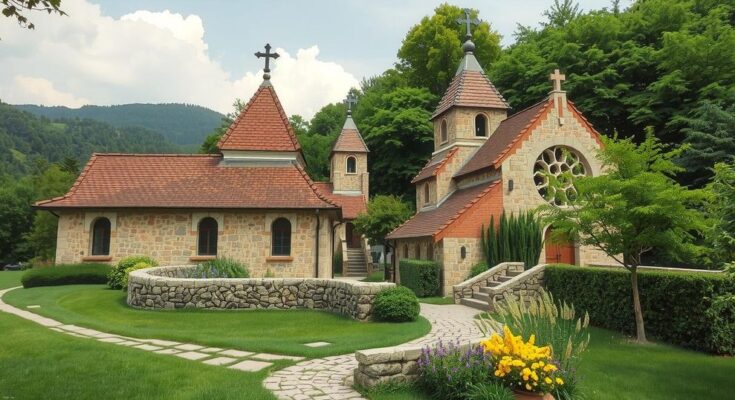A delegation of Syrian Druze clerics traveled to Israel for the first pilgrimage since 1948. Approximately 60 clerics visited the Tomb of Nabi Shuaib and met with local Druze leader Sheikh Mowafaq Tarif. The visit has generated controversy among their peers in Syria and reflects the division and complexities within the Druze community amid ongoing political changes.
A delegation of Syrian Druze clerics embarked on a significant pilgrimage to Israel on Friday, marking the first such trip since the establishment of the state of Israel in 1948. Approximately 60 clerics gathered near the village of Hader, situated in the demilitarized zone of the Golan Heights, under the surveillance of recently deployed Israeli soldiers.
Upon arrival, the clerics were transported by two buses to Israel, where they planned to visit the Tomb of Nabi Shuaib in the Galilee, an essential figure in the Druze faith. They are also scheduled to meet Sheikh Mowafaq Tarif, the spiritual leader of the Druze community in Israel.
Media access to the pilgrims is restricted, as they have been instructed not to engage with journalists or carry mobile phones during their visit. This pilgrimage comes at the invitation of the Druze community in Israel but has faced opposition from some members of the Druze minority in Syria.
The Druze, known for their esoteric monotheistic beliefs, are distributed across several regions, including Syria, Israel, Lebanon, and the Golan Heights. They represent approximately three percent of Syria’s population, predominantly located in the southern Sweida province.
Following the ousting of Syrian president Bashar al-Assad in December, Israel reinforced its military presence in Golan, which has been occupied since 1967 and annexed in 1981. Additionally, Israel’s Druze have facilitated food aid deliveries to their Syrian counterparts, with the most recent shipment occurring on Wednesday.
In response to escalating tensions, particularly after violent clashes between government forces and Druze fighters in Damascus, Israeli Defence Minister Israel Katz issued a warning against any harm to the Druze community. Druze leaders, however, promptly dismissed Katz’s comments, reaffirming their commitment to a unified Syria.
Despite largely remaining neutral during Syria’s prolonged civil conflict, Druze factions have concentrated on safeguarding their territories from external threats. Currently, Druze representatives are in dialogue with the new Syrian leadership to explore options for the integration of their armed groups into the national security forces.
The recent pilgrimage of Syrian Druze clerics to Israel signifies a notable development in cross-border relations and highlights the complexities within the Druze community. While the visit follows an invitation from Israeli Druze, it has been met with resistance from some Syrian Druze. The community remains divided amid political upheaval in Syria, reflecting broader tensions within the region.
Original Source: www.newarab.com




